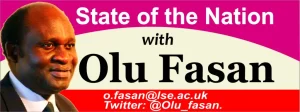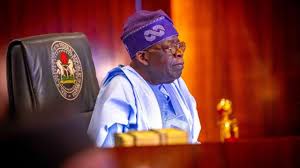
By Olu Fasan
Professor Wole Soyinka recently said that he would not assess the performance of the Bola Tinubu administration until after its first year in office. His reason? Most presidents “don’t start from ground zero. They often start lower than ground zero and they have to make up.” Professor Soyinka said this had always been his principle. “So, I’m adopting the same principle this time.”

Well, Professor Soyinka is perfectly entitled to adopt that principle, but it’s not a universal one. Elsewhere, a new president is assessed regularly after his first 100 days in office. The reason polling agencies are popular in the West is because they regularly gauge public opinion on a president’s policies and overall performance.
This is highly valuable in a democracy because if, in a four-year term, a president spends one year settling down and another politicking for re-election, as is often the case, he effectively has only two years to focus on governance. That’s why most countries seek leaders who are well prepared and can hit the ground running, and why the citizens of every nation must hold their leaders’ feet to the fire and constantly pronounce their verdict on their performance.
Now, Nigerians were told that Tinubu was thoroughly prepared for power, that no previous president was ever more prepared than him. Indeed, as Bishop Matthew Kukah, the Catholic Bishop of Sokoto Diocese, reminded Tinubu in his Christmas message, “for the better part of over 20 years, you have plotted to be our President.” Note the word “plotted” for it truly describes how Tinubu manoeuvred to advance his “lifelong” ambition.
For over 20 years, Tinubu amassed incredibly stupendous wealth; built extensive and formidable patronage-clientage networks; engaged in self-serving political horse-trading; and, when it mattered, muscled his way through his party’s presidential primaries and the presidential election to become president. But was he not, in all those years, also deep-diving into Nigeria’s problems, unearthing
solutions and preparing what he would do with power? Why should Tinubu, whose party has just ruled Nigeria for eight years, start “even lower than ground zero” and need one year to make up? Leave aside the fact that he became “president-elect” in February, three months before he took office.
Yet, the past eight months of Tinubu’s administration has been nothing but blood, sweat and tears for most Nigerians. Then, he added insult to injury with his utterly vacuous New Year’s speech; it’s as if rhetorical blusters and pie-in-the-sky promises can transform people’s lives. I once advised fellow Nigerians in this column that when they read political speeches, they should remember George Orwell’s famous words that “political language is designed to make lies sound truthful and murder respectable, and to give an appearance of solidity to pure wind.” The Orwellian insight is particularly pertinent to the Tinubu government, which is suffused with experts in sophistry, propaganda and dissemblance. They and those in their echo chamber belittle the rest of Nigerians.
Recently, former Governor Kayode Fayemi of Ekiti State advised the APC national chairman, Abdullahi Ganduje, to give Tinubu truthful feedback from the people, “not what he is hearing in the villa where he is locked out.” But how can fawning acolytes, including Ganduje himself, ever tell Tinubu the truth? Have you noticed that virtually every prominent person in Tinubu’s government now wears the “Tinubu cap”? How can a country that produced the first African literature Nobel laureate, a country that produced the first African head of the World Trade Organisation, not to mention countless other global achievers, have a government full of toe-curling sycophants who hero-worship or idolise the president?
In 2022, when he was leaving President Buhari’s government to run for the APC presidential primaries, Godswill Akpabio, now Senate President, told Buhari: “As we step down from the Federal Executive Council, I want you to know that you have disciples in us. I want you to know that it’s time for us to propagate Buharism.” Tell me, who is talking about Buharism today? That’s how dishonest most Nigerian politicians are, and why you must take the Tinubu government’s rhetoric, whatever it says, with a pinch of salt, not at face value.
Which brings us to how to assess the performance of Tinubu and his government. As Nigeria is the second most-religious and second most-prayerful country in the world, I like to appeal to religion in this column. In his Christmas message, Bishop Kukah told Tinubu: “Neither God nor history will forgive you if you fail.” Well, let’s start with God before we come to history. How does God judge leaders?
In Proverbs 29:2, the Bible says: “When the righteous are in authority, the people rejoice; but when the wicked rules, the people groan.” For “righteous”, put good leaders; for “wicked”, put bad leaders. The key point is that God judges a leader by people’s groaning. In Nehemiah 5:14-18, Nehemiah, who was governor of Judah for 12 years, said that, throughout his governorship, he did not avail himself of the emoluments and perks of the office “because the bondage was heavy upon the people”.
By contrast, Nigerians are groaning bitterly, while their leaders live in outrageous opulence, buying a presidential yacht and fleets of SUVs, renovating their houses with billions of naira, increasing their salaries by 114 per cent, etc. That’s how to assess Tinubu’s performance: the people’s groaning and his government’s response to it. Would the N28.78trillion 2024 budget tackle the debilitating hardship in Nigeria?
What about history? Well, hear the great philosophers and statesmen. Aristotle said politics is “primarily concerned with the development and actualisation of human flourishing”. Thomas Jefferson, former US president, said that “the care of human life and happiness is the only legitimate object of good government.” And for Harold Macmillan, former UK prime minister, “the central aim of domestic policy must be to tackle unemployment and poverty.”
Tinubu will say he’s in politics to actualise those ideals. But the reality doesn’t match the rhetoric. Nigerians are being killed in their thousands on his watch. Poverty has reached dizzying heights under him. Palliatives will make no difference. The so-called “national living wage”, eroded by nearly 30 per cent inflation, is meaningless. What’s more, Nigeria won’t make progress unless it’s first united and stable. Tinubu will fail woefully if he doesn’t lead a cross-party and multi-ethnic process to restructure Nigeria. That’s how he will be judged!
Happy New Year, fellow Nigerians!




GIPHY App Key not set. Please check settings